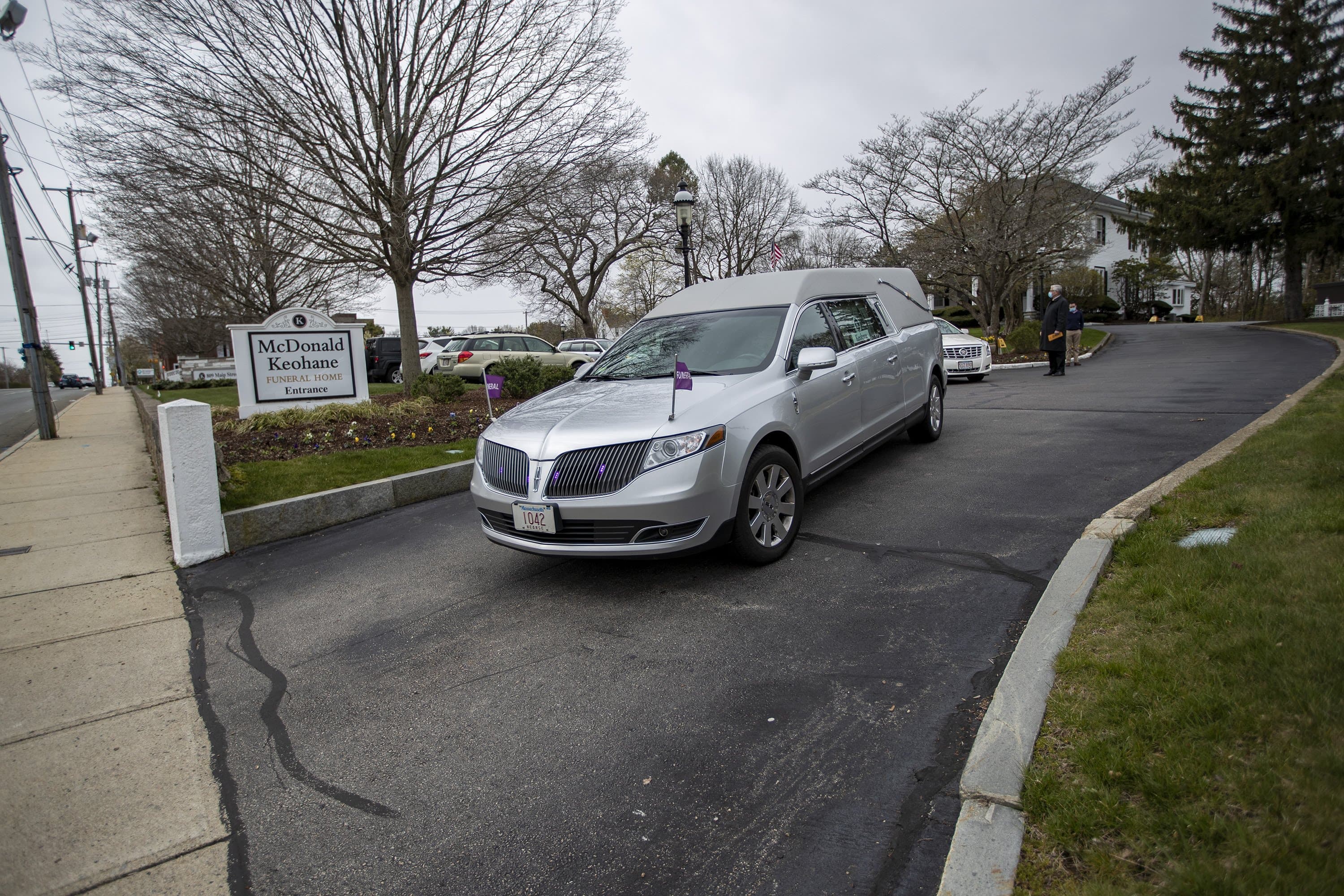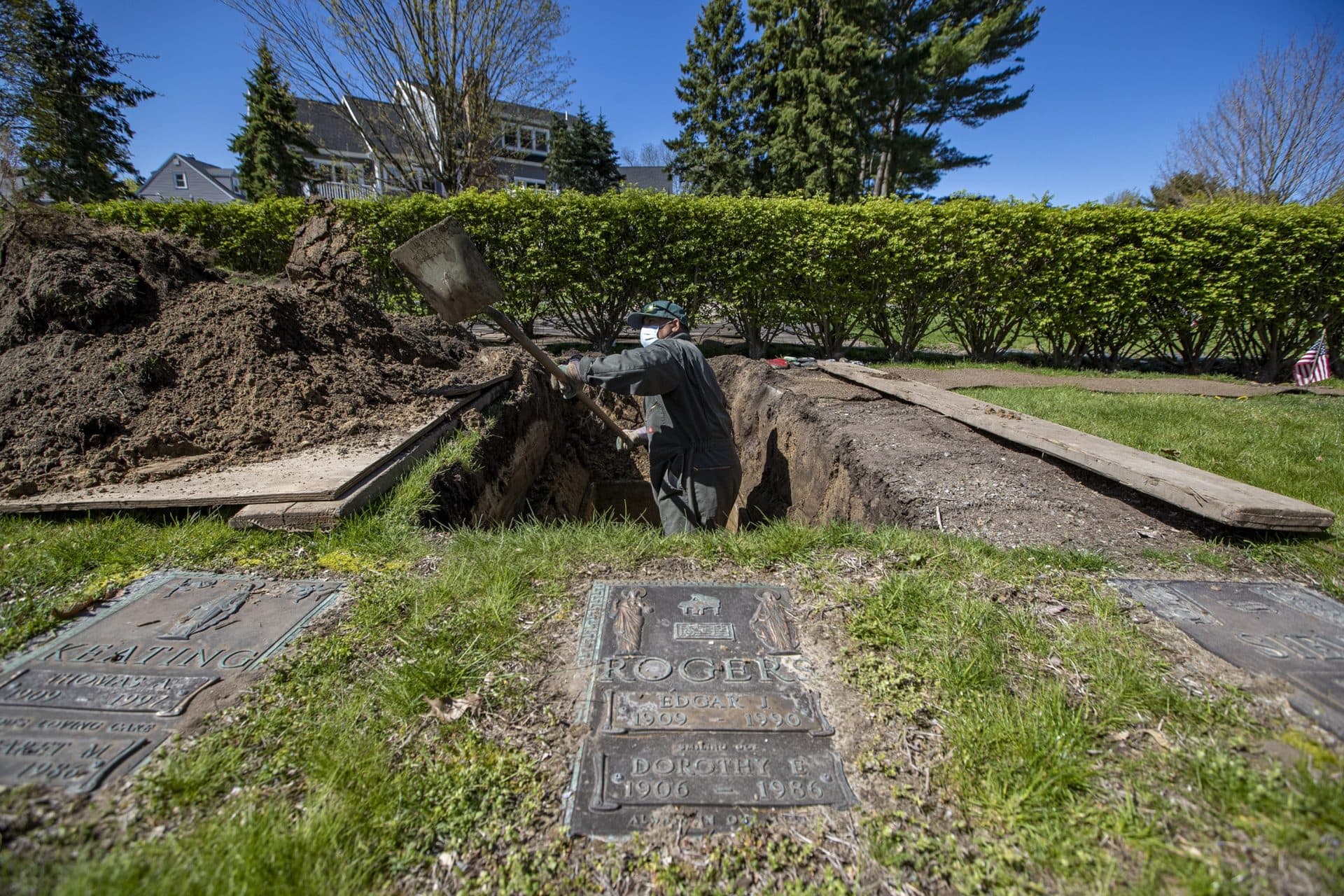Advertisement
Coronavirus Coverage
'Unfathomable': As Last Responders, Funeral Home Staffers See Wave Of Work — And Changes — Amid Pandemic
Resume
Funeral home employees, some of Massachusetts' last responders, must assume everyone, dead or alive, has the coronavirus.
It's a grim reality for these workers, who have been forced to adjust protocols in the face of profound uncertainties about their own safety amid the pandemic, as they prepare the deceased and try to support mourners saying final goodbyes.
And with more than 4,200 COVID-19 deaths in Massachusetts, as well as deaths from other causes, funeral homes are busier than ever.
“This is unfathomable,” said Joe Reardon, vice president at Keohane Funeral Home in Quincy. “I never thought in a million years we’d end up in a situation like this, but it's here, and we're doing the best we can to care for families within the restrictions.”
Before the virus, funeral employees would normally just wear gloves. Now they are covered head-to-toe in personal protective equipment (PPE) when they arrive at a hospital, nursing home or house to pick up the dead.
Reardon said they’ve installed PPE kits in their vehicles that include surgical caps, foot coverings, gloves, face shields, N95 masks and gowns.
When someone dies at a hospital, the body may go to a mortuary for a short period of time and then a funeral home vehicle will pick it up. Hospitals report their morgues are so full, some bodies are stored in refrigerated trailers or units on site.
Reardon said some hospitals are double-bagging bodies to reduce the threat of transmission.
If someone dies at home, Reardon said funeral home workers ask the family if the person who died had the coronavirus — and if anyone in the household might have it. (Rarely, the Office of Chief Medical Examiner deals directly with these deaths, said its spokesman Jake Wark. It only investigates suspicious, sudden or unattended deaths.)
Coronavirus is primarily transferred via respiratory droplets when someone sneezes, coughs or talks. But the CDC states the virus can live on some surfaces for up to three days, possibly infecting people who then touch their nose, mouth or eyes.
Depending on the condition of the deceased and the potential exposure to staff, Reardon said they sometimes wear Tyvek suits, which are resistant to liquids and protect them from diseases.
“We just want to make sure that if it is on the person's skin, because it could be, or if it is being expelled from the respiratory system during the transfer process, that we mitigate that risk,” Reardon said.
Key questions linger for those working with the dead and families mourning their loved ones in small services: How long can the virus stay on a body, and can someone get the virus from the dead?
“I've asked that question probably 10 times and nobody's really given me a good answer yet,” said Bob Lawler, funeral director of the Lawler and Crosby Funeral Home in West Roxbury.
And because so many deceased haven’t been tested for the virus or results haven't come back yet, Lawler said they assume every dead body is contaminated.
In just one week, he said his funeral home handled roughly 15 COVID-19-related deaths. Their supply of gloves had run low, but they had just received a shipment of them from Massachusetts Emergency Management Agency. For Lawler, days start at 7 a.m. and sometimes end at 10 p.m., with usually four burials and several cremations. Luckily, they haven't run out of room in their morgue, he added.
"We're very, very busy," he said. "We're not overwhelmed."
In a video meeting in March with the National Funeral Directors Association, the CDC explained its recommendations for people attending services.
CDC Capt. Jill Shugart told them there is no risk for someone being in the same room as the deceased at a funeral. But because they are still determining all the ways the virus can spread, CDC recommends no contact with the body.
“People should consider not touching the body of someone who has died of COVID-19,” Shugart said in the video. “Kissing, washing and shrouding should be avoided before, during and after the body has been prepared if possible.”
Washing is part of a ritual for some Muslims and Orthodox Jews. In those cases, the CDC said PPE should be used.
At funeral homes in Massachusetts, employees who embalm the body or prepare it for cremation wear PPE, like they normally would.

Workers also must limit the number of people visiting the funeral home when someone dies to just 10, due to statewide social distancing rules. Live video ceremonies are frequently held for people who can’t attend.
Lawler said there are more cremations and graveside services with clergy instead of church services, which aren’t allowed.
But it’s not just the dead, funeral home directors worry about.
“There is also a risk and probably a greater risk of working with the living because they may have been exposed, could be exposed, may not know if they are exposed,” Reardon said. “When someone walks through our door, we don’t know.”
This segment aired on May 6, 2020.
